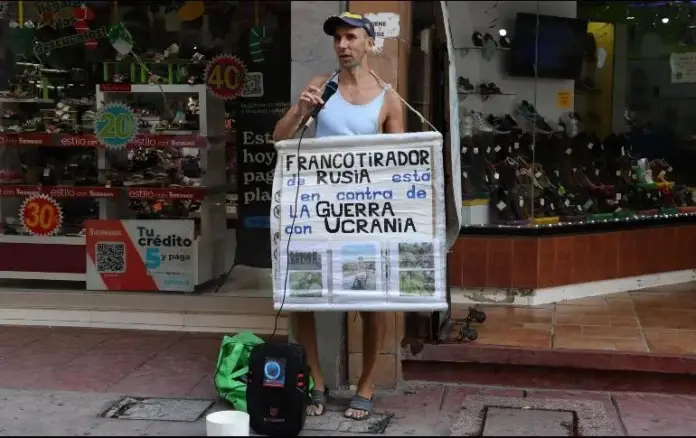
Mexico has become a refuge for irregular migration from Russia. The Mexican government reports a 64% year-on-year increase in irregular migration from that country.
In Tapachula, the largest city on Mexico’s southern border, Tajir claims to have belonged to the Russian Special Forces, but fled the country to avoid being part of the war in Ukraine, so now he asks that Mexico allow him to remain legally away from the conflict.
“I served in the special forces 14 years ago and I don’t want to participate in the war against Ukraine because Ukraine is defending its territory and I don’t want to shoot people defending their territory, I don’t want to live with that in my head afterwards. If the war were to end, I would return,” he told EFE.
Mexico detected 335 irregular migrants from Russia from January to August 2024, when it reported a record of more than 925,000 people from all countries, according to the Government’s Migration Policy Unit.
Tajir left Russia to go to Kazakhstan, then to Kyrgyzstan and Argentina, and finally to the southern border of Mexico, where he bought a speaker and a microphone to sing in the Spanish he now knows.
“I want to live in Mexico, work as a Physics-Mathematics teacher like before in Russia. Now I am singing three times a week and other days I am learning Spanish, I need to raise the level because I need to live in Mexico and work more than on the street, then I want to rent, I am living in a shelter,” he said.
The man has been in Tapachula for more than seven months, where he went to the Mexican Commission for Refugee Aid (Comar), which has denied his request.
He says that his intention is not to go to the United States, but to settle for a while in Mexico, where some citizens ask for support.
“There are many organizations that are dedicated to helping many migrants, it would be good if they helped him in what he is looking for because he is a person like any migrant, he is looking for job opportunities and he is looking to do good,” the young Denis Aguilar, who approached him to help him, told EFE.
Increase in Russian LGBTI+
On the other hand, Casa Frida, which welcomes LGBTI+ migrants, detected an “exponential increase” in Russian users after the start of the war in Ukraine, in February 2022, and the “worsening” of policies against the group by the president, Vladimir Putin.
“When before, perhaps, one or two people arrived per year, rather one or two per month began to arrive,” the institution’s consultant Cristian Andrade told EFE.
This is due, according to Andrade, to the migration caused by the war and a worsening of the situation of the LGBTI+ community within Russia.
“We have detected that, mainly, these people leave as a result of the escalation of violence (towards this group),” the consultant emphasizes, who specifies that Russian migrants have been detected both in the Casa Frida center in Mexico City and in Tapachula.
A testimony of this particular phenomenon is Anatoly, a Russian citizen who fled to Mexico, where he was a Casa Frida user for two weeks and now works as a volunteer translator in the organization.
He lived for a time in St. Petersburg until at the end of 2022 he executed his plan to escape to Mexico.
“I had friends here. Mexico City was an option, neither the best nor the worst,” he acknowledged.
Now, he added, his heart “belongs to Mexico”: he has a temporary resident visa, works in a Mexican company and studies Spanish.
Anatoly said that, for migrants from Russia, the United States is usually the first option, while Mexico is a country of waiting to get an immigration appointment on the other side of the border.
“They are afraid to stay in Mexico because Spanish is spoken and they don’t want to study it. They think that in the United States they have more opportunities,” he said.
In five years, Anatoly hopes for a “more interesting” life and a Mexican passport in his pocket. In fact, he already feels “a little more” Mexican than Russian.
“I’m going to be a chilango (from Mexico City),” he joked.
Source: informador




